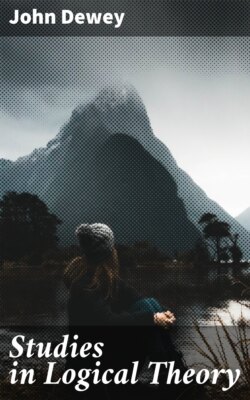Studies in Logical Theory

Реклама. ООО «ЛитРес», ИНН: 7719571260.
Оглавление
Джон Дьюи. Studies in Logical Theory
Studies in Logical Theory
Table of Contents
PREFACE
I
THOUGHT AND ITS SUBJECT-MATTER: THE GENERAL. PROBLEM OF LOGICAL THEORY
II
THOUGHT AND ITS SUBJECT-MATTER: THE ANTECEDENT. CONDITIONS AND CUES OF THE THOUGHT-FUNCTION
III
THOUGHT AND ITS SUBJECT-MATTER: THE DATUM OF. THINKING
IV
THOUGHT AND ITS SUBJECT-MATTER: THE CONTENT AND. OBJECT OF THOUGHT
V
A CRITICAL STUDY OF BOSANQUET'S THEORY OF. JUDGMENT[44]
VI
TYPICAL STAGES IN THE DEVELOPMENT OF JUDGMENT
I
II
VII
THE NATURE OF HYPOTHESIS
I
II
III
VIII
IMAGE AND IDEA IN LOGIC
IX
THE LOGIC OF THE PRE-SOCRATIC PHILOSOPHY[87]
X
VALUATION AS A LOGICAL PROCESS
I
II
III
IV
V
VI
XI
SOME LOGICAL ASPECTS OF PURPOSE
INTRODUCTORY
I. THE PURPOSIVE CHARACTER OF IDEAS
II. PURPOSE AND THE JUDGMENT
III. THE CRITERION OF TRUTH AND ERROR
IV. SUMMARY AND CONCLUSIONS
INDEX
Footnote
Отрывок из книги
John Dewey
Published by Good Press, 2021
.....
In the course of changing experience we keep our balance as we move from situations of an affectional quality to those which are practical or appreciative or reflective, because we bear constantly in mind the context in which any particular distinction presents itself. As we submit each characteristic function and situation of experience to our gaze, we find it has a dual aspect. Wherever there is striving there are obstacles; wherever there is affection there are persons who are attached; wherever there is doing there is accomplishment; wherever there is appreciation there is value; wherever there is thinking there is material-in-question. We keep our footing as we move from one attitude to another, from one characteristic quality to another, because we know the position occupied in the whole growth by the particular function in which we are engaged, and the position within the function of the particular element that engages us.
The distinction between each attitude and function and its predecessor and successor is serial, dynamic, operative. The distinctions within any given operation or function are structural, contemporaneous, and distributive. Thinking follows, we will say, striving, and doing follows thinking. Each in the fulfilment of its own function inevitably calls out its successor. But coincident, simultaneous, and correspondent within doing, is the distinction of doer and of deed; within the function of thought, of thinking and material thought upon; within the function of striving, of obstacle of aim, of means and end. We keep our paths straight because we do not confuse the sequential, efficient, and functional relationship of types of experience with the contemporaneous, correlative, and structural distinctions of elements within a given function. In the seeming maze of endless confusion and unlimited shiftings, we find our way by the means of the stimulations and checks occurring within the process we are actually engaged with. We do not contrast or confuse a condition or state which is an element in the formation of one operation with the status or element which is one of the distributive terms of another function. If we do, we have at once an insoluble, because meaningless, problem upon our hands.
.....